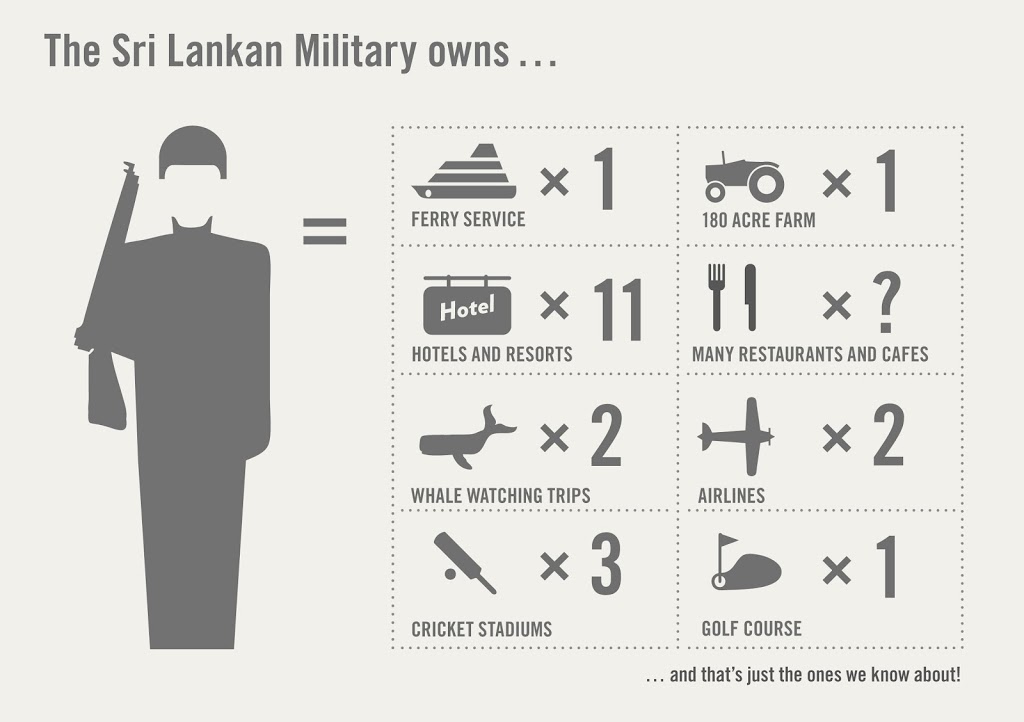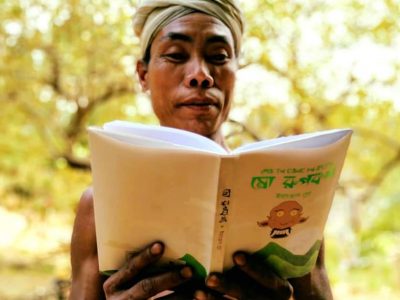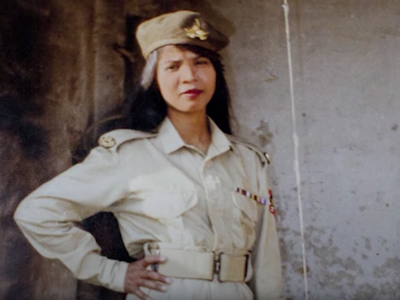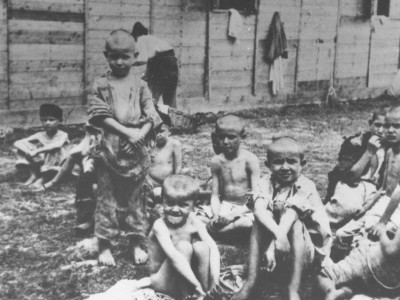几百年来,斯里兰卡都是旅游胜地,观光业是当地主要的收入来源与经济推动力。历时25年多内战对旅游业造成重创,使得这一支柱产业的发展停滞不前,而该国终于在2009年结束这场内战。
战争结束后斯里兰卡的观光业快速地成长。在旅游和其它发展政策的推动下,斯里兰卡政府在首都可伦坡(Colombo)往北175公里的卡尔皮帝耶(Kalpitiya)开拓了一片4,000英亩的观光发展计划,那里景色优美,闻名世界。
瑞莎.威可马汀(Raisa Wickrematunge)在Groundviews发表的文章指出,仅在今年1月到8月之间,斯里兰卡的游客人数已经超过100万。观光产业能直接或间接的提供数千个工作职位。
然而有证据表明,当地人民被有计划性地阻挡在旅游产业之外。威可马汀发现许多当地民众表示他们不能在旅游公司工作,在一些情况下,有人甚至被禁止为旅客直接提供划船和住宿接待等服务。的确,许多酒店都不愿意聘请当地劳工,无论是私人还是军有酒店。
此外,斯里兰卡军方花费重金投资观光事业,他们拥有数家酒店和度假中心、许多餐厅、咖啡店、以及其他旅游设施。
全球风险指标(Global Risk Insights)最近的一份报告指出,斯里兰卡的军方使用强征入伍的军人作为军有度假中心和娱乐场所的员工,并只支付微不足道的薪水。受迫人民协会(Society for Threatened Peoples)发表了一份报告《乌云之下的阳光天堂(Dark Clouds Over The Sunshine Paradise)》,报告指出,通过雇佣军人,军方在旅游事业中赚取丰厚的额外收入,并在成本上打败私人经营对手。
旅客在斯里兰卡的消费大部分都进了军方的口袋。批评者认为这一情况愈演愈烈,而且在内战结束后,这一现象并没有继续存在的理由。因为原则上来说,战后的国家应该趋向非军事化,但斯里兰卡境内却还有约20万军队,也就是说约每10个公民中就有1位是军人,他们就驻扎在泰米尔人口居住区的北部。
观光业的快速发展同时也引发了其他问题。军方和私人企业所引领了新一波的观光计划,这些计划剥夺了许多当地人民的祖传土地,严重影响了包括库奇差维利(Kuchchaveli)、帕西库达(Passikudah)、卡尔皮帝耶、贾夫纳(Jaffna,位在北部省)以及巴拿马(Panama,位在西部省的安帕赖区)等地区的当地生活与文化。
Groundviews的伊夫.鲍伊(Yves Bowie )分享了几则当地社区的故事:
Kuchchaveli is a small fishing village in the north-east of Sri Lanka. The people are mostly engaged in fishing and agriculture. At the end of the war, a lot of land in Kuchchaveli was occupied by the Sri Lankan Navy. The villagers had to leave their own homes, their farms, and their fishing areas. After the end of the war they wanted to return to their land but the Navy did not leave.
库奇差维利是一个位在斯里兰卡东北的小渔村,当地人民主要从事渔业和农业。在内战末期,海军占领了库奇差维利大部分土地,迫使村民背井离乡。内战结束后村民想要回到原有的土地,但海军却还没撤离。
The villagers in Passikudah area are mostly fishermen and their families. They have been fishing in this area for generations. After the hotels were built most of them had to leave their workplaces. The boat fishermen were sent to a very small place in the corner of the bay, which they also might have to leave soon. They are under a big risk of losing their livelihood.
帕西库达区域的居民组成主要为渔夫与其家眷,他们世世代代在此地从事渔业。当此地开始兴建饭店之后,这些居民必须离开原有的工作地,使用小船的渔民被送到海湾边角一个非常小的海域,但很快地他们可能也须离开这个临时的渔场。这些人民正面临失去生计的危机。
同样在Groundviews,鲁奇.费尔南达(Ruki Fernanda)和赫尔曼.库马尔(Herman Kumar)写道:
Tourism must be centered on local populations and war affected peoples. Consultations with them is crucial if tourism is to act as catalyst for peace, reconciliation and development. Tourism projects should take into account their sufferings, aspirations and support their struggles for truth, justice and economic development in a sensitive way.
Tourism must not destroy or damage socio-economic-cultural practices of local communities and uproot them from their traditional lands and livelihoods. They should not be marginalized and denied economic opportunities presented. [..]
Government and military must not use tourism as means to promote their political agendas and propaganda. Memorials and other remembrance initiatives by local communities must be promoted and government must also initiate official monuments and remembrances focusing on civilians and all those affected.
旅游业必须以当地人民和受到战事影响的居民为中心。既然旅游业的目的是为了促进和平和发展,那么,政府就应当与这些居民共同商议旅游业的发展。发展过程中应该考虑到这些人民遭受的苦难,体谅并支持他们以谨慎的方式追求真理、正义和经济发展。
旅游业的发展不应破坏当地社区的社会、经济、文化现状,也不应该剥夺当地居民代代相传的土地和生计。当地居民不应该在新的经济机会出现时被边缘化和剔除。 […]
政府和军方不应该利用旅游业作为推广政治章程和宣传的工具。而是要提供支持,帮助当地社群组成的追念或其他纪念性的倡议团体,政府也必须推动官方的纪念性活动,真正关注百姓和那些受到影响的人民。









